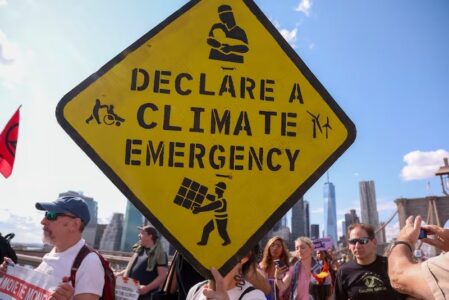Stakeholders in Alterra, the UAE’s $30 billion climate fund, are actively investing and attracting additional investors to support renewable energy projects totalling more than 40 gigawatts, said Dr Sultan Al Jaber, Minister of Industry and Advanced Technology and the fund’s chairman.
Dr Al Jaber, who was also Cop28 President, was speaking at a high-level discussion during New York Climate Week, one of the biggest annual climate events in the world, which is running until September 29.
Global leaders from businesses, politics, local government and civil society have gathered to discuss and advance climate action. The event coincides with the 79th UN General Assembly, also taking place in New York City.
Dr Al Jaber emphasised that Alterra, launched at the Cop28 climate conference in Dubai last year, was created to meet the urgency of the moment by seizing the opportunity of green industrialisation and climate action.
“Since our launch … we have placed $6.5 billion with our partners BlackRock, TPG and Brookfield, with a significant portion helping to create emerging market funds focused on climate-transition investments,” he said.
“Each partner is putting skin in the game and attracting more investors to fund real projects with a combined portfolio of over 40 gigawatts of clean energy across five continents.”
On Monday, Texas-based TPG announced it had secured $1.3 billion in initial commitments for its Global South Initiative (GSI), aimed at attracting large-scale institutional capital by offering better returns to boost private equity investment in “high-growth climate opportunities” across the Global South.
TPG and Alterra launched GSI at Cop28, targeting $2.5 billion in total capital commitments.
Meanwhile, the New York Stock Exchange-listed Brookfield Asset Management has raised $2.4 billion for a climate-finance-focused fund to invest in clean energy projects in emerging markets, reaching about half of the fund’s $5 billion total capital target.
The Catalytic Transition Fund was launched with up to $1 billion of capital provided by Alterra.
The International Monetary Fund and the World Bank have identified public-private risk-sharing as key to fostering private climate investment in emerging markets. Institutional investors control assets worth more than $200 trillion, only 0.3 per cent of which is going towards climate financing.
Monday’s discussion centred on unlocking investment opportunities, overcoming barriers in emerging markets and strengthening public-private collaboration to meet global climate goals.
“By forming strategic partnerships and leveraging innovative financing mechanisms, we are mobilising critical investments that will not only accelerate the global transition to clean energy but also ensure that no region is left behind,” said Majid Al Suwaidi, chief executive of Alterra.

By 2030, emerging markets and developing economies will require $2.4 trillion a year to address climate change, according to the Climate Policy Initiative.
Meanwhile, Deloitte estimates that investment of $5 trillion to $7 trillion a year is needed until 2050 in the energy sector to drive the transition. Less than $2 trillion is currently spent annually.
“We are already exploring numerous opportunities and the fund’s first investments will begin later this year, bridging the financing gap that exists in emerging markets and building institutional capacity to bring down future investment costs,” said Mark Carney, chairman and head of transition investing at Brookfield Asset Management.
Alterra is making progress through innovative financial strategies and partnerships, Jim Coulter, executive chairman of TPG said. “The new strategy is generating strong engagement from clients across Asia, Europe, and North America and unlocking a broader set of investment opportunities across the Global South,” he added.
At Cop28, countries pledged to triple renewable energy capacity and double energy efficiency by 2030.
Fifty oil and gas companies, representing more than 40 per cent of global oil production, signed the Oil and Gas Decarbonisation Charter, which calls for net-zero emissions by 2050 or before.



